Business
Hairdressers laments low patronage as women now go on low cut
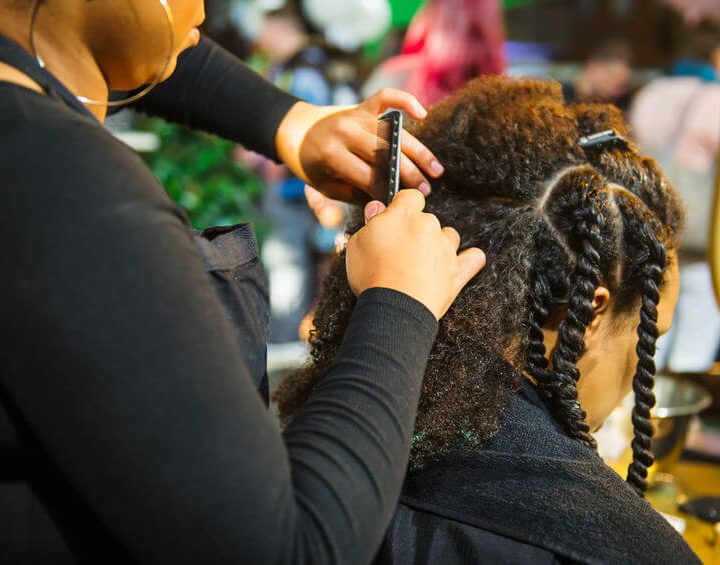
It’s becoming commonplace that women now go on low-cut. That, usually was not the case, even a decade ago.
The pride of a woman used to be the length and lustre of her hair. Traditionally, low haircuts are meant for the menfolk.
In the eastern part of Nigeria, when women lose their husbands, they are made to cut their hair as part of traditional rights.
Similar traditional rites are performed in the Western parts of the country on such occasions.
Now, fashion, convenience and mostly cost, are driving the unknown culture of women shaving their hair to the skull.
Some, even ice the new culture by tinting the hair with different colours of spray paints – a style only known in the past with noticeably wild ladies and musicians.
Today, middle-aged Nigerian women, mostly married, have joined a well known American musician, Anita Baker to popularise a particular style of low hair cut named after her. Others go completely skin-cut leaving no hair at all.
When they are reminded of culture and tradition, they point to rising cost of braiding, weavons and other accessories attached to extension-based hairstyles.
Others cite civilisation, convenience,vogue and fashion as reasons to jettison the old ways of wearing the hair.
However, this newly embraced lifestyle has made hairdressers struggle to make ends meet.
Majority of them in different parts of Lagos complain that they could hardly make N3,000 per day as most of the women patronise barber shops rather than hairdressing salons.
Mrs Abibatu Salami, a hairdresser, who spoke to Economy & Lifestyle said: “The business is getting boring every day.
We hardly see customers who want to make extension-based hair.
All we get are children making simple weavings and didi. Some of my customers have cut their hair saying the prices of hair extensions are high.
With the rising cost of commodities in the market, our union saw reasons to adjust our charges, so we can also cope, but that has worsened the case.
Now we are even struggling to make up to N3,000 a day. This is against the good times when a hairdresser who knows her onions would go home everyday with at least, N20,000 or N30,000.”
Wiser with choices
On a random visit to hair accessories’ shops recently, Economy&Lifestyle discovered shockingly that the cost of Expression Rich brand of hair attachment has risen by 41 per cent from N1200 last year to N1700 currently.
Similarly, prices of synthetic hair extensions are between N2000-N5,000 while quality human hair extensions cost between N100,000 and N200,000.
Bone straight Vietnam wig costs N75,000 to N100, 000 depending on the length.
Brazilian wool costs N250 and a braided wig costs between N10,000 and N18, 000.
Meanwhile, depending on her economic power, a woman may need up to four or five pieces of these accessories for a complete hair-do.
Mary Osamudiame, a teacher and businesswoman said: ” My salary is less than N50,000. If I make all my purchases for the month, I have less than N3,000 left.
If I decide to make extension-based hair which will require me to buy weavon and other accessories, where will I get the money? That is why I decided to go on low hair cut.
When I saw the rising cost of hair extensions and the cost of fixing them, I saw wisdom in directing my choices appropriately.
In this present economy, as a woman, you have up to N5,000 before requesting the most common service in a hair salon, so if you don’t do the maths very carefully, one will put her family in danger,” she added.
Mrs Adebisi Adebanjo, a civil servant, said: The economic situation has a negative impact on most women’s lives. I have even gone on a low hair cut.
I decided to cut my hair when the prices of hair extensions and hair-making services started rising and I am enjoying it.
I no longer worry about hair making. I just visit the salon every four months to get my hair trimmed.
I use the money for hair extensions on other things,” she claimed.
Business
Dangote refinery reduces ex-depot price of petrol to N970 for oil marketers

The Dangote Petroleum Refinery has announced a reduction in its ex-depot price of premium motor spirit (PMS), also known as petrol, to N970 per litre for oil marketers.
This is a cut from the refinery’s N990 ex-depot price announced earlier this month, according to a statement on Sunday.
The slash would help marketers save about N20 on each litre of petrol bought from the Lekki-based plant.
Anthony Chiejina, Dangote Group’s chief branding and communications officer, said the move is the refinery’s way of appreciating Nigerians “for their unwavering support in making the refinery a dream come true”.
“In addition, this is to thank the government for their support as this will complement the measures put in place to encourage domestic enterprise for our collective well-being,” the statement reads.
“While the refinery would not compromise on the quality of its petroleum products, we assure you of best quality products that are environmentally friendly and sustainable.
“We are determined to keep ramping up production to meet and surpass our domestic fuel consumption; thus, dispelling any fear of a shortfall in supply.”
Business
Allegation of missing fund untrue, says Access Bank
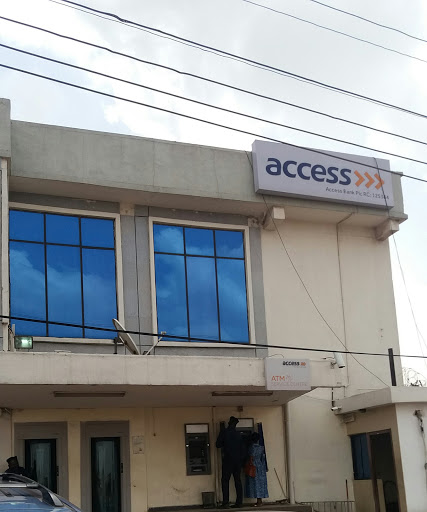
Access Bank Limited has dismissed as untrue allegations of missing fund and unethical behaviour.
The Bank in a statement said: “Our attention has been drawn to a video on social media wherein allegations of missing funds and unethical behaviour have been made against Access Bank PLC.
“First and foremost, we wish to emphasise that the safety and security of our customers’ funds are core priorities which we take seriously. Second, Access Bank Plc does not engage in or condone any unethical behaviour.
“In the instant case, the allegations of missing funds in the Bank are most untrue and baseless.
“There is no N500million or any other fund or amount missing from the subject customer’s account or from any other customer’s account with us.
“We and other independent stakeholders in the banking industry have thoroughly investigated these allegations and independently arrived at the same conclusions.
“Access Bank PLC operates with the highest ethical standards, and we protect our customers’ interests whilst also respecting privacy laws.
“Consequently, whilst we have engaged and will continue to engage with our customers, we must advise the public not to rely on or believe sensational and unverified claims that are designed to titillate and mislead the public.
“We remain committed to serving our customers.”
Business
31 electricity towers affected as vandals destroy transmission lines in Edo communities

The Transmission Company of Nigeria (TCN) says vandals in Benin, Edo state, have destroyed 31 transmission towers.
In a statement on Friday, Ndidi Mbah, TCN’s director of public affairs, confirmed that vandals attacked transmission towers in Okada and Ofosu communities along the 330kV Benin-Egbin and Benin-Omotosho transmission lines.
Mbah said the vandalised towers, which suffered significant damage with critical components removed earlier in November, were discovered by TCN linesmen during a routine patrol.
“A total of 31 towers were affected in this incident,” she said.
“TCN engineers from the Benin Sub-Region have initiated repairs to prevent the collapse of the affected towers and to avoid disruption of bulk power supply.”
‘AHOADA-YENAGOA LINE UNDER REPAIR TARGETED BY VANDALS’
Mbah also said its Ahoada-Yenagoa 132kV line, which was under repair following a previous attack, was once again targeted by vandals.
The TCN spokesperson confirmed that the attack, which occurred on November 19, affected towers 29 to 31 and resulted in the theft of approximately one-third of the conductor.
On August 14, TCN announced that Bayelsa state would face a prolonged power outage following the destruction of 13 transmission towers along the Ahoada-Yenagoa 132kV double circuit transmission line by vandals.
The transmission company, on October 29, reported that 65 percent of the damaged transmission towers had been repaired.
The company said 17 transmission towers had been successfully erected, with work continuing on the remaining three.
“A team of TCN engineers, led by Engr. Emmanuel Akpa, General Manager of the Port Harcourt Region, has conducted an inspection of the site,” the statement reads.
“Preliminary findings indicate that the incident occurred at night. In an attempt to prevent further theft while repair arrangements are being made, local security has been engaged at Ula Ikata in Ahoada East LGA to secure the site until repairs are completed.
“Additionally, the line will be energized from the Ahoada end as a preventive measure.”
Mbah added that efforts are underway to replace the stolen 250mm conductor.
Despite challenges posed by difficult terrain and flooding, she said the restringing of the Ahoada-Yenagoa 132kV line is approximately 85 percent complete.
The public relations officer stressed that the incidents underscore the urgent need to address the growing problem of vandalism and theft, which continue to affect Nigeria’s power infrastructure.
She urged the public to support efforts to tackle such criminal acts, which have hindered the expansion and stability of the national grid.
Mbah also called on security operatives and local communities to remain vigilant in protecting power infrastructure in their areas as TCN intensifies its efforts to safeguard its installations.
-
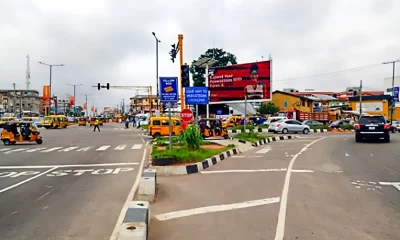
 Business1 week ago
Business1 week agoLagos state government to commence upgrade of major junctions in Ikeja axis, seeks residents’ cooperation
-

 Politics1 week ago
Politics1 week agoDSS operatives arrest man with bags of cash during Ondo guber
-
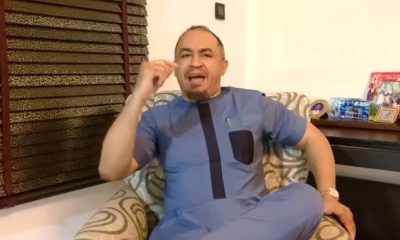
 Celebrities1 week ago
Celebrities1 week agoDaddy Freeze, Akah Nnani clash over Emmanuel Iren
-

 Special Features2 days ago
Special Features2 days agoIyabo Ojo, Brainjotter, Dayo Oketola, Penzaarville, Tomiwa and others to speak at the Bodex Social Media Hangout 5.0
-
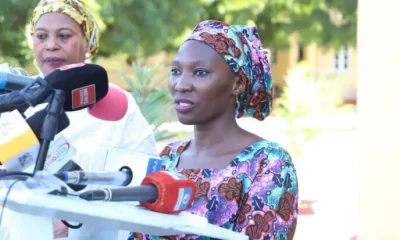
 News1 week ago
News1 week agoAlice Loksha, abducted UNICEF nurse, escapes captivity after 6 years
-

 News1 week ago
News1 week agoNnamdi Emeh: Suspect Facing Charges In Court, Process Independent Of Police Influence
-
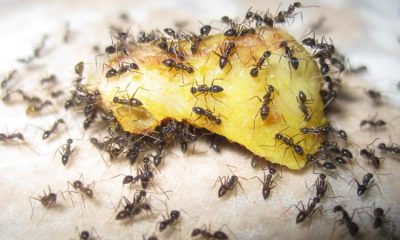
 Health1 week ago
Health1 week agoFive ways to rid your home of ants
-
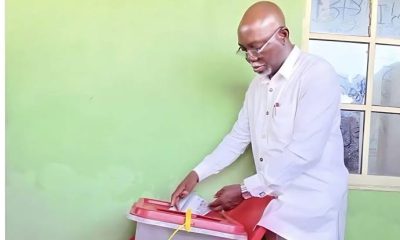
 Politics1 week ago
Politics1 week agoAiyedatiwa takes commanding lead in Ondo guber poll after winning 15 of 18 LGAs


















